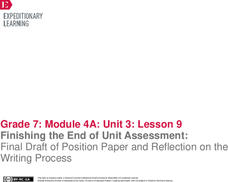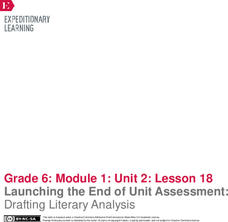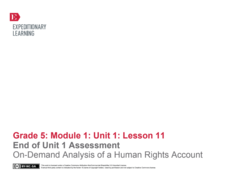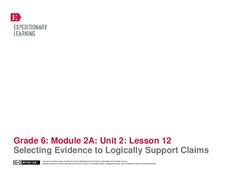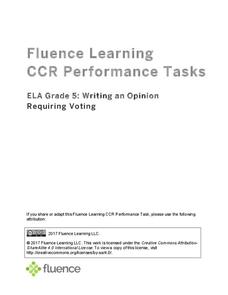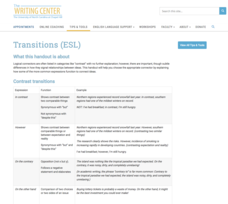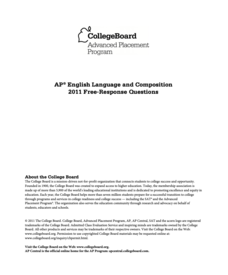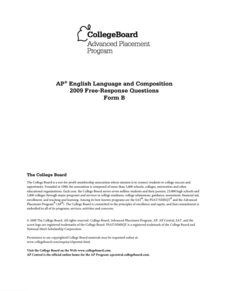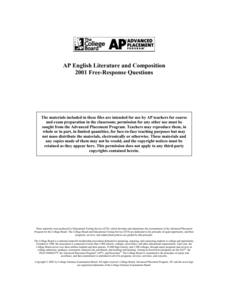EngageNY
End of Unit Assessment, Part 1, Continued: Revising Vocabulary and Conventions Based on Feedback
Writers align their position papers with the last two rows in the rubric. After looking at the rubric rows for vocabulary and conventions along with feedback on their papers, class members revise their essays. They then look at the...
EngageNY
Finishing the End of Unit Assessment: Final Draft of Position Paper and Reflection on the Writing Process
Think about it. Writers think about their end of unit essays through reflection. They use the End of Unit 3 Assessment, Part 2: Reflection on the Writing Process handout to analyze the writing process they used to create their...
EngageNY
Launching the End of Unit Assessment: Drafting Literary Analysis
Is there a connection? Scholars work to write a summary and theme to connect The Lightning Thief and myth of Cronus. They begin by looking at a model essay and then work on their own drafts.
K20 LEARN
Introduction to Expository Writing
Move beyond the five-paragraph essay with a lesson introducing young writers to various forms of expository writing. Class members examine description, cause and effect, problem solution, sequence, and comparison forms. They create an...
EngageNY
End of Unit 1 Assessment: On-Demand Analysis of a Human Rights Account
The last instructional activity in this unit about human rights consists of a final assessment. To demonstrate the skills your class has acquired throughout this unit, they will work with a new article entitled "From Kosovo to the United...
EngageNY
Pitching Your Claim with Best Evidence
Does Bud use his rules to survive or thrive? That is the driving question of a lesson plan following the reading of Bud, Not Buddy by Christopher Paul Curtis. In an argument essay prewriting activity, pupils use textual evidence to...
EngageNY
Selecting Evidence to Logically Support Claims
It's time to make a rule sandwich! After exploring the writing assignment's rubric and analyzing a model essay, learners are guided through the prewriting phase using the sandwich technique. Pupils create their sandwich addressing the...
Florida Department of Environmental Protection
Water's Journey Expedition
Step into a scientist's shoes to go online and discover the Florida Springs Expedition, and participate in two activities focusing on how humans impact the environment. The first activity asks scholars to summarize the six...
Fluence Learning
Writing About Informational Text: Political Parties
To demonstrate their ability to craft an analysis of informational text, class members read excerpts from James Madison's "The Federalist No. 10," from George Washington's Farewell Address, and from Thomas Jefferson's First Inaugural...
Fluence Learning
Writing an Opinion Requiring Voting
Challenge writers to compose an essay detailing their stance on, and the history of, voting. Three assignments, each broken down into three parts, requires fifth graders to take notes, read and complete charts, write paragraphs, compare...
University of North Carolina
Transitions (ESL)
When it comes to comparing and contrasting in an essay, looking at a chart and picking a random transition word may not do the trick. As explained in an informational writing handout, the words writers use to move from one idea to...
Pearson
Practice Test - English Language Arts Reading Comprehension
An English Language Arts Reading Comprehension Practice Test for Grade 10 asks scholars to read a poem and answer two multiple-choice questions about the poem. They finish the task by responding to an open-response essay question.
Orlando Shakes
Shakespeare in Love: Study Guide
What word has two syllables and means a ray of moonlight? If young readers guessed moonbeam, they are correct! With the Shakespeare in Love study guide, participants test their guessing skills in an exciting game of Shakespeare Taboo...
New York State Education Department
English Language Arts Examination: June 2016
The English Language Arts Examination handout contains a variety of multiple-choice questions to assess reading comprehension, in addition to a source-based argument essay and text-analysis response prompts.
College Board
2014 AP® English Language and Composition Free-Response Questions
For some students, college may not be worth the cost. Free-response questions from the 2014 AP® English Language and Composition exam cover a variety of topics, including the value of a college education. Writers review six sources to...
College Board
2011 AP® English Language and Composition Free-Response Questions
Mammals can be carnivores, omnivores, and herbivores, but what about locavores? A set of free-response questions from the 2011 AP® English Language and Composition exam introduces test-takers to the term, which describes people who try...
College Board
2010 AP® English Language and Composition Free-Response Questions
Humorists do more than tell jokes; they also impart key messages about society. A series of free-response topics from the AP® English Language and Composition exam cover three topics, including one discussing the role of humorists....
College Board
2010 AP® English Language and Composition Free-Response Questions Form B
Although the United States observes Daylight Savings Time, many countries decided against it. A free-response question, part of a set of sample questions from the 2010 AP® English Language and Composition exam, has writers consider the...
College Board
2009 AP® English Language and Composition Free-Response Questions Form B
In writing, an argument can be considered valid if writers have evidence to support it. Free-response questions from the AP® English Language and Composition exam ask writers to craft three argumentative essays. One prompt asks test...
College Board
1999 AP® English Literature and Composition Free-Response Questions
Have you ever felt like you are pulled into two directions? Some authors depict this feeling in their characters. Scholars choose a play or novel in which a character is pulled or influenced by two different directions and write essays...
College Board
2001 AP® English Literature and Composition Free-Response Questions
Do 100 years make a difference? Scholars compare two poems written 100 years apart. They also analyze characterization used in a passage from Tom Jones by Henry Fielding. A final essay question allows writers to choose a piece of...
College Board
2003 AP® English Literature and Composition Free-Response Questions Form B
Ever felt stuck in the middle? Some characters do. Scholars choose a novel or play and write essays describing how a character is stuck between cultures. Writers also analyze the techniques used in a passage from We Were the Mulvaneys...
College Board
2011 AP® English Literature and Composition Free-Response Questions
A packet of materials from the 2011 AP® exam provides scholars with an opportunity to examine scored sample essays for the three free-response questions. Included are the prompts, the rubric, scoring guides and sample papers.
College Board
2000 AP® English Language and Composition Free-Response Questions
No one is perfect. George Orwell argues imperfection is preferred over sainthood. Scholars write essays describing how he expresses his argument in writing. Writers also respond to Eudora Welty's recollection of life experiences with...
Other popular searches
- Expository Essays
- Compare & Contrast Essays
- Narrative Essays
- Narrative Essay Writing
- Writing Essays
- Comparative Essay
- Literary Essays
- Personal Essays
- Photo Essays
- Four Paragraph Essays
- Famous People Sports Essays
- Narrative Essay Prompts



